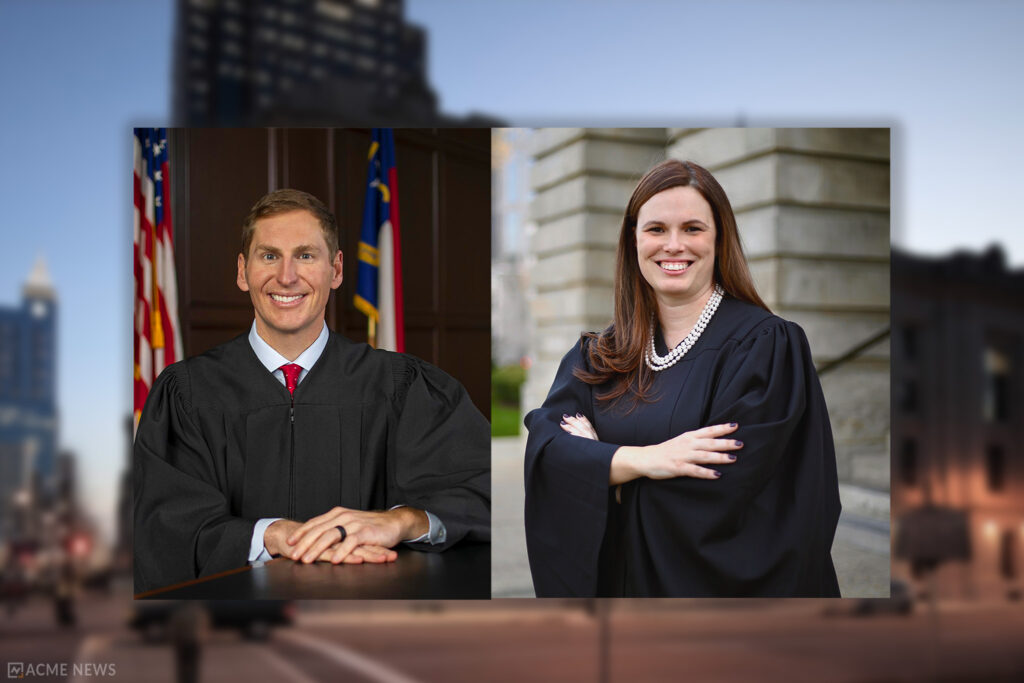
ASHEBORO N.C. (ACME NEWS) — The race for a seat on the North Carolina Supreme Court remains unsettled more than five months after Election Day, with Democratic Justice Allison Riggs holding a slim 734-vote lead over Republican challenger Jefferson Griffin. A series of legal battles and court rulings have left the final outcome uncertain.
Just two weeks after a ruling from the North Carolina Court of Appeals said nearly all of the 60,000 challenged ballots would need to be cured. Today, due to a ruling by the N.C. Supreme Court, that number is down to under one thousand.
WHAT HAPPENED
- April 11: The North Carolina Supreme Court ruled that more than 60,000 ballots previously set aside must be counted. The court found that errors related to missing voter registration information were administrative mistakes made by election officials, not voters themselves.
- April 13: Justice Rigss announces a petition for a preliminary injunction has been filed in federal court seeking to block the cure process until a federal court can hear the case.
- April 15: A federal judge allowed the State Board of Elections to begin eligibility reviews of certain contested ballots but barred the final certification of the race until the review process is completed.
- April 17: Republican attorneys filed a new legal challenge arguing that additional overseas and military ballots should be disqualified unless voters prove their eligibility under stricter standards.
The Supreme Court’s decision marked a major shift in the case, affirming that the largest group of ballots, over 60,000, cast by voters who had made ‘a good-faith effort to register’, out of jeopardy of being invalidated due to what the court called “administrative errors”. However, the court also directed the State Board of Elections to conduct a “cure process” for overseas and military ballots.
Under the ruling, voters who cast ballots while abroad or serving in the military will have 30 days to verify their eligibility if their records are incomplete. The cure process is scheduled to begin Monday, April 21.
We reached out to the NC Board of Elections to try and find out more about the cure process, the remaining ballots, and advice for voters who have had their ballot challenged dismissed. As of the time of publication, we have not received a response.
Roughly 800 ballots require additional verification, according to state election officials the Supreme Court. Voters will likely be notified by mail and email where possible, and those who do not respond by the deadline risk having their ballots disqualified.
The rights of overseas and military voters to cast ballots under more flexible rules stem from a 2011 North Carolina law passed nearly unanimously by the General Assembly. The legislation, designed to comply with the federal Military and Overseas Voter Empowerment Act (MOVE Act), simplified registration and absentee ballot access for military families and citizens living abroad. The bill passed the Republican-controlled legislature with broad bipartisan support — with only one dissenting vote in the House — and was signed into law by Democratic Gov. Bev Perdue.
It remains unclear whether the North Carolina Supreme Court’s April 11 decision will affect how protections for overseas and military voters under the 2011 law are applied.
Nearly six months after the election, the only certainty appears to be more legal battles. Justice Allison Riggs has indicated she intends to challenge the cure process in court, seeking to block it entirely, while Jefferson Griffin has already filed a lawsuit aiming to limit the state’s eligibility reviews and the number of ballots under consideration.
###

